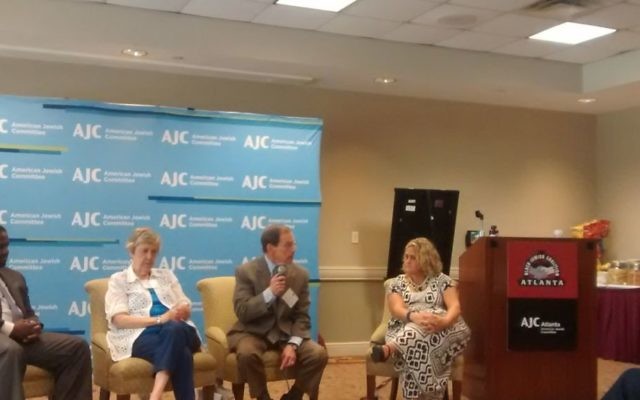Understanding Grows at Black-Jewish Retreat
By Benjamin Kweskin
On the way to the biennial Project Understanding Black-Jewish Retreat, Mimi Hall, a 2013 project participant, said: “If I decided tomorrow I don’t want to be Jewish, no one, including the police, would treat me any differently. African-Americans do not have that same luxury as Jews.”
“Driving while Jewish” is not a real thing. Jews are neither harassed nor closely watched in stores, and Jews make up a minuscule percentage of inmates in America’s overcrowded, increasingly privatized prisons. Though anti-Semitism is still an issue in the United States, its overall impact is nowhere near what it was decades ago.

(From left) Ceasar Mitchell, Sherry Frank, Arnie Sidman and B.J. Bernstein participate in the Project Understanding panel discussion Sunday, Aug. 23.
But African-Americans continue to face many of the same social, structural and economic ills that have plagued them since the abolition of slavery and advent of Jim Crow laws.
The weekend of Aug. 22 and 23, the American Jewish Committee’s Atlanta Chapter hosted the biennial retreat at the Wyndham Hotel and Conference Center in Peachtree City. Established in 1989, Project Understanding seeks to break down barriers and bring together the black and Jewish communities.
The program facilitates discussions about race, income inequality, educational disparities, police brutality, anti-Semitism, the Arab-Israel conflict and other issues. Luminaries such as Atlanta Mayor Kasim Reed and recently deceased civil rights leader Julian Bond have been involved with the Black-Jewish Coalition.
Sponsored by the Marvin C. Goldstein Project Understanding Young Leadership Retreat Endowment Fund and the Lois Frank and Terri and Mickey Lubin/Atlanta Regional Office Endowment Fund, the coalition holds Project Understanding every other year.
“It was very interesting for me to meet people on both sides who didn’t come from diverse backgrounds like myself and had no concept of the other,” 2013 alumna Lauren Linder said. “Yes, this program facilitates a safe space and environment, but we do discuss many tough issues.”
Nearly 100 applicants, mostly black women, applied for the 32 slots, evenly split between blacks and Jews. The conference offered seminars such as “Everything I’ve Always Wanted to Know,” “What We Would Like Them to Know About Us” and “What Difference Are We Going to Make as a Community and Coalition?”
“Growing up in Atlanta, I have worked with many African-Americans, and I wanted to better understand their community,” one of this year’s participants, Renée Rosenheck, said. “It was a great opportunity to learn and collaborate towards future social change.”
One of the major takeaways for her was that the black community “still feels the after-effects of slavery on a daily basis. The sheer fact that only 30 percent of black males graduate from high school is appalling. It was also important to learn that many African-Americans have a deep respect and admiration for the Jewish community’s successes.”
The only part of the conference open to alumni and the public was the Sunday afternoon luncheon and panel discussion, moderated by lawyer B.J. Bernstein.
Panelist Arnie Sidman, author of “From Race to Renewal,” said that given its special history and demographic makeup, Atlanta is the place to talk about race in America.
“You have the ability to change the city and country for the next decades to come, depending on how you deal with current issues facing our communities,” said panelist Ceasar Mitchell, the president of the Atlanta City Council and an alumnus of Project Understanding.
Fellow panelist and Black-Jewish Coalition founder Sherry Frank said: “These relationships must be personal and real. These relations must be sustained, and we must deal with all issues, whether it is ‘driving while black’ or other unjust policies, and we must continue to push to change legislation.”
James Hammond, a project participant born and raised in Atlanta, said the retreat helped him understand the similarities and differences between blacks and Jews in terms of historical and current discrimination. “I did not realize Jews faced discrimination in the U.S. post-Holocaust.”
He said the new project alumni won’t leave behind what they learned at the retreat. Instead, they “are bringing this to our communities and continuing our conversation so we can act upon them. We are agents and liaisons to and for our communities.”
His only complaint: “The retreat should be much longer.”




comments